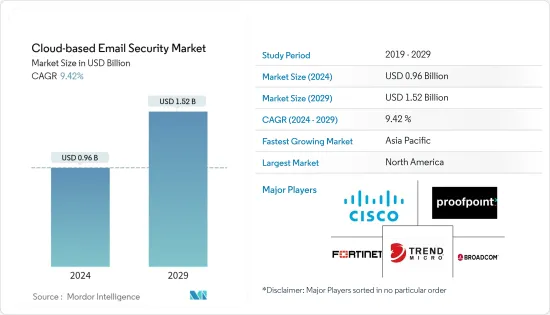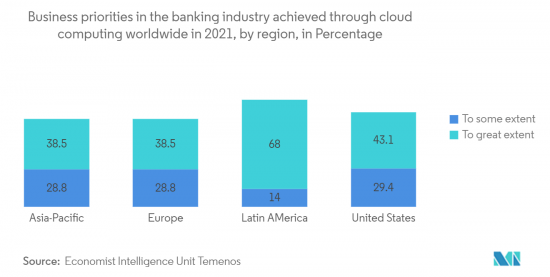 |
市場調査レポート
商品コード
1403126
クラウドベースの電子メールセキュリティ-市場シェア分析、産業動向・統計、2024年~2029年の成長予測Cloud-based Email Security - Market Share Analysis, Industry Trends & Statistics, Growth Forecasts 2024 - 2029 |
||||||
● お客様のご希望に応じて、既存データの加工や未掲載情報(例:国別セグメント)の追加などの対応が可能です。 詳細はお問い合わせください。
| クラウドベースの電子メールセキュリティ-市場シェア分析、産業動向・統計、2024年~2029年の成長予測 |
|
出版日: 2024年01月04日
発行: Mordor Intelligence
ページ情報: 英文 120 Pages
納期: 2~3営業日
|
- 全表示
- 概要
- 目次
クラウドベースの電子メールセキュリティ市場規模は、2024年に9億6,000万米ドルと推定され、2029年には15億2,000万米ドルに達すると予測され、予測期間中(2024~2029年)のCAGRは9.42%で成長すると予測されます。

主要ハイライト
- クラウドセキュリティソフトウェアは、クラウドインフラ全体を保護するためにクラウドサービスプロバイダーやユーザーが導入する必須ツールの1つです。アマゾンのようなeコマース企業のように、重要な情報交換源としてインターネットに依存している企業は、サイバー攻撃に対してより脆弱です。金融機関や医療部門は、金銭的な利益が大きく、ハッカーにとって有利な対象となる他の企業の一つです。しかし、電子メールセキュリティのアウトソーシングには、サードパーティ・プロバイダーのサービスに依存し、信頼しなければならないため、固有のリスクがあります。
- クラウドベースの電子メールセキュリティソフトウェアは、フィッシングやなりすましの脅威を防ぐのに役立ち、マルウェアのないなりすましやビジネス電子メール侵害攻撃の対象となる組織のプロファイルを自動的に特定し、メッセージ内容の機械学習分析によって攻撃をブロックします。
- 世界市場で著名な電子メール市場ベンダーである99 Firmsによると、2019年の世界の電子メールユーザーは約39億人で、2023年には約43億人に達すると予想されています。データポートによると、電子メールの45%がスパムであり、企業に年間約205億米ドルの損害を与えています。サイバー環境と関連技術の成長は、新たな脅威への道を開いた。サイバー攻撃は高度に標的化され、執拗で、技術的に高度です。
- さらに、技術的な問題や財政破綻によって、電子メールセキュリティのアウトソーシングが中断される可能性もあります。セキュリティプロバイダの深刻な電子メール障害は、クラウドベースのセキュリティに対する組織の信頼を低下させる可能性があります。IBMによると、業種にもよるが、電子メールの60%がモバイル端末で開封されており、スパム電子メールやフィッシング電子メールなど、電子メールに関する脅威が増大しています。オンサイトのデータセンター設置面積の削減やコスト削減の必要性、スパムやウイルス、電子メールを介した不適切なコンテンツの発生件数の増加、柔軟な展開オプションなどの要因が、市場の成長に拍車をかけています。
- さらに、クラウド電子メールサービスの普及に伴い、セキュリティベンダーはクラウドプロバイダーと協力して、より迅速でシームレスなセキュリティソリューションの展開方法を提供しています。例えば、脅威インテリジェンス管理とサイバー・フュージョン・ソリューションのプロバイダーであるサイウェアは、2023年6月、高度な電子メールセキュリティでサイバー・フュージョンを拡大するため、Mimecastとの戦略的提携を発表しました。この共同ソリューションは、ランサムウェア、フィッシング、マルウェア、その他の進化するサイバー脅威に対するプロアクティブな防御を顧客に提供します。
- COVID-19の発生により、クラウドベースの電子メールセキュリティ市場は、さまざまな国でロックダウンが実施される中、組織がリモートワークアクセスを導入していることから、クラウドベースのサービスやツールの採用が増加しており、大幅な成長が見込まれていました。マイクロソフトは、Teams製品の月間利用者数がイタリアで1カ月間に775%増加し、電話や会議が増加したことに気づいた。グーグルが提供したデータによると、同社は毎日約1,800万通のCOVID-19スパム電子メールをブロックしています。パンデミックの間、クラウドベースのサービスの利用が増加しており、何100万人もの人々が不慣れで安全性の低い状況で仕事をしているため、サイバー攻撃のホットスポットとなりつつあります。
クラウドベースの電子メールセキュリティ市場動向
BFSI分野でのクラウドベースの電子メールセキュリティ利用の増加が市場を牽引
- 金融部門では、顧客から大量のデータが生成されます。銀行や金融機関では、さまざまなデータポイントを通じて収集したデータを活用し、顧客満足度を向上させるために、複雑なデータを保存・分析するサービスを採用するケースが増えています。さらに、顧客の期待が高まり、技術力が向上し、規制要件が強化される中、銀行機関はセキュリティに対する積極的なアプローチを採用する必要に迫られています。その結果、クラウドベースのセキュリティプラットフォームの導入が進んでいます。
- サイバーセキュリティはBFSI企業にとってさらに重要であり、BFSI企業は規制コンプライアンスを確保し、顧客の機密性の高い金融情報を常に保護する必要があります。大手銀行や資本市場は、クラウドベースのセキュリティプラットフォームが単なる技術以上のものであるとの認識を深め、市場の成長機会をさらに生み出しています。
- クラウドベースの電子メールソリューションは、管理アクセス・コントロールに関する規制に対応しようとする銀行にとって、導入にかかる時間とコストを削減するのに役立ちます。電子商取引の増加に伴い、データは指数関数的に増加しています。BFSI部門の従業員と顧客間の電子メールのやり取りには、非常に有利で重要かつ貴重な情報が含まれており、ハッカーに大きな利益をもたらす可能性があります。さらに、社内外の主要なコミュニケーション手段として電子メールを使用している投資銀行部門の組織は、電子メールアカウントを暗号化し、盗聴やハッキングを制限する措置を講じています。
- ITプロセスやシステムの安全性、顧客の重要データの保護、政府規制の遵守のため、民間と公的銀行はサイバー攻撃を防ぐ最新技術の導入に注力しています。さらに、顧客の期待が高まり、技術力が向上し、規制要件が強化される中、銀行機関はセキュリティに対する積極的なアプローチを採用する必要に迫られています。サイバー犯罪者の手口はますます巧妙になっています。金融サービス企業にとって最もコストのかかる攻撃タイプは、サービス拒否、フィッシング電子メール攻撃、ソーシャル・エンジニアリングです。
- さらに、サイバー犯罪者も同様の機能を利用して侵入していることから、機械学習と人工知能(AI)が最も求められるソリューションとして台頭してくると予想されます。このようなリスクに対抗し、軽減するために、組織によるセキュリティ能力強化への投資がさらに集まると予想されます。

北米が最大の市場シェアを占める
- 北米は、世界中の主要組織の主要拠点です。さまざまなエンドユーザー産業の拡大とIoTの成長が、この地域のスマートデバイスとモバイルの需要を牽引しています。攻撃のリスクは、個人や政府から企業まで、さまざまな市場に影響を与える可能性があります。そのため、この地域ではデータの安全確保が優先事項となっています。
- 電子メールは最も一般的なツールの1つであり、企業が毎日使用するものです。FBIのインターネット犯罪報告書によると、漏洩した企業電子メールや電子メールアカウントは悪質なフィッシングキャンペーンの一部であり、米国企業に約24億米ドルの損害を与えました。
- また、北米、特に米国におけるサイバー攻撃は急速に増加しています。その数は過去最高を記録したが、これは同地域における接続デバイス数の急増が主要原因です。マイクロソフト社によると、米国は依然として最も標的の多い国で、世界のサイバー攻撃の46%が米国で発生しています。
- 米国では、サイバーセキュリティソリューションやサイバー脅威を検知するソフトウェアやプラットフォームへの投資が増加しています。中小企業から大企業に至るまで、企業の意識が高まる中、米国政府はサイバー攻撃を防止し、データを保護し、不正行為や脅威を検知するプログラムを導入するため、より厳格なソリューションを展開するためのイニシアチブをいくつか取っています。例えば、米国政府は2023年3月、すべての米国人が安全なデジタル・エコシステムの恩恵を十分に享受できるようにするため、国家サイバーセキュリティ戦略を発表しました。
- さらに、いくつかの地域企業は、高まる需要に応えるため、新たなソリューションの提供に注力しています。例えば、2022年11月、バラクーダネットワークス社は、顧客が電子メールセキュリティデータの複雑さを軽減できるように、Amazon Security Lakeと統合した電子メールセキュリティを提供すると発表しました。同社の電子メールプロテクションソリューションは、電子メールセキュリティソリューションを通じて顧客のセキュリティデータへのアクセスを合理化し、コストを削減し、調査、脅威検出、インシデント対応など、さまざまなセキュリティユースケースをカバーしています。
クラウドベースの電子メールセキュリティ業界概要
世界のクラウドベースの電子メールセキュリティ市場は、少数の参入企業が大きな市場シェアを占めているため、完全に統合されています。新規参入企業は既存の市場に参入しようとしています。同市場の主要参入企業には、Cisco Systems Inc.、Proofpoint Inc.、Trend Micro Inc.、Fortinet Inc.などがいます。最近の市場開拓には以下のようなものがある:
- 2023年5月、LogRhythmはMimecastとの技術提携を発表し、電子メールセキュリティ、エンタープライズセキュリティ、脅威管理機能を高度に組み合わせて提供することを明らかにしました。同社は、Mimecast社の電子メールセキュリティ機能とLogRhythm社の企業向け脅威管理機能を統合する予定です。この統合により、両社は世界中の組織が最新のサイバー攻撃から保護できるよう支援することを目指しています。
- 2022年10月、サイバーセキュリティとコンプライアンスの企業であるプルーフポイント社は、2022年マイクロソフト・イグナイト・カンファレンスにおいて、その脅威保護プラットフォームにおけるいくつかのイノベーションを発表しました。今回の改善により、電子メール詐欺の検知、サードパーティやサプライヤの侵害に対する防御、機械学習(ML)、行動分析に関する比類のない洞察が得られ、これらはすべて、導入が簡単な新しいインラインAPI形式で利用できるようになりました。
その他の特典:
- エクセル形式の市場予測(ME)シート
- 3ヶ月間のアナリスト・サポート
目次
第1章 イントロダクション
- 調査の前提条件と市場定義
- 調査範囲
第2章 調査手法
第3章 エグゼクティブサマリー
第4章 市場洞察
- 市場概要
- 業界の魅力度-ポーターのファイブフォース分析
- 供給企業の交渉力
- 消費者の交渉力
- 新規参入業者の脅威
- 代替品の脅威
- 競争企業間の敵対関係の強さ
- COVID-19の市場への影響
第5章 市場力学
- 市場促進要因
- IoT技術の採用拡大
- 資本コストの削減と迅速な導入
- BFSI分野でのクラウドベースの電子メールセキュリティ利用の増加が市場を牽引
- 市場抑制要因
- 情報損失のリスク
第6章 市場セグメンテーション
- 導入モデル別
- 公共
- 民間
- ハイブリッド
- エンドユーザー産業別
- BFSI
- 政府機関
- IT・通信
- 小売
- その他エンドユーザー産業
- 地域別
- 北米
- 米国
- カナダ
- 欧州
- ドイツ
- 英国
- フランス
- イタリア
- スペイン
- その他の欧州
- アジア太平洋
- 中国
- インド
- 日本
- オーストラリア
- 韓国
- その他のアジア太平洋
- ラテンアメリカ
- メキシコ
- ブラジル
- アルゼンチン
- その他のラテンアメリカ
- 中東・アフリカ
- 北米
第7章 競合情勢
- 企業プロファイル
- Cisco Systems Inc.
- Proofpoint Inc.
- Trend Micro Inc.
- Fortinet Inc.
- Broadcom Inc.
- Forcepoint LLC
- Mimecast Inc.
- Sophos Group PLC
- Dell Technologies Inc.
- FireEye Inc.
第8章 投資分析
第9章 市場の将来

The Cloud-based Email Security Market size is estimated at USD 0.96 billion in 2024, and is expected to reach USD 1.52 billion by 2029, growing at a CAGR of 9.42% during the forecast period (2024-2029).
Key Highlights
- Cloud security software is one of the essential tools deployed by cloud service providers and users to protect the overall cloud infrastructure. Companies that rely on the Internet as a vital source of information exchange, such as e-commerce companies like Amazon, are more vulnerable to cyberattacks. Financial institutions and healthcare sectors are among the other businesses with high financial gains and lucrative targets for hackers. However, email security outsourcing has an inherent risk, as organizations must rely on and trust a third-party provider for service.
- Cloud-based email security software helps to prevent phishing and imposter threats, and it automatically identifies an organization's profile targets for malware-free impersonation and business email compromise attacks and blocks the attack with machine learning analysis of message content.
- According to 99 Firms, a prominent email market vendor in the global market, there were about 3.9 billion email users worldwide in 2019, which is expected to reach approximately 4.3 billion in 2023. According to the data port, 45% of emails are spam, which costs businesses about USD 20.5 billion annually. The growth of the cyber environment and related technologies paved the way for new threats. Cyberattacks are highly targeted, persistent, and technologically advanced.
- Moreover, technical issues or financial bankruptcy may interrupt email security outsourcing. A severe email failure of security providers can lower an organization's confidence in cloud-based security. According to IBM, 60% of emails are opened on mobile devices, depending on the industry, which increases the threat of spam mail, phishing mail, and other threats related to email. Factors such as a need for decreasing onsite datacentre footprints and cost savings, coupled with increasing incidences of spam, viruses, inappropriate content through email, and flexible deployment options, are spurring the market growth.
- Furthermore, with the widespread adoption of cloud email services, security vendors collaborate with cloud providers to offer faster and more seamless ways of rolling out security solutions. For instance, in June 2023, Cyware, a provider of threat intelligence management and cyber fusion solutions, announced a strategic partnership with Mimecast to extend cyber fusion with advanced email security. The joint solution will provide customers with proactive defense against ransomware, phishing, malware, and other evolving cyber threats.
- With the outbreak of COVID-19, the cloud-based email security market was expected to grow significantly as cloud-based services and tools were increasingly adopted due to organizations deploying remote work access amid lockdowns in various countries. Microsoft noticed an increase of 775% in Italy, calling and meeting monthly users for the Teams product in one month. According to data provided by Google, the company blocked about 18 million COVID-19 spamming emails daily. The increasing usage of cloud-based services during the pandemic is becoming a hotspot for cyberattacks, as millions work in unfamiliar and less secure circumstances.
Cloud-based Email Security Market Trends
Increasing use of cloud based email security in BFSI sector to drive the market.
- The financial sector generates a massive volume of data generated by its customers. Banks and financial organizations increasingly employ services to store and analyze complex data to use the collected data through various data points and improve customer satisfaction. Additionally, with higher customer expectations, growing technological capabilities, and regulatory requirements, banking institutions are pushed to adopt a proactive approach to security. This has resulted in the incorporation of cloud-based security platforms.
- Cybersecurity is even more important for BFSI companies, which need to ensure regulatory compliance and protect the sensitive financial information of their customers at all times. Large banks and capital markets increasingly recognize that the cloud-based security platform is more than just technology, further creating growth opportunities for the market.
- Cloud-based email solutions can help reduce implementation time and costs for banks trying to keep pace with regulations regarding administrative access control. The data is exponentially growing, with an increase in e-transactions. Email exchanges between employees and customers in the BFSI sector contain highly lucrative, important, and valuable information and can greatly benefit hackers. Additionally, organizations in the investment banking sector that use email as their primary means of communication internally and externally have encrypted their email accounts and taken steps to limit eavesdropping and hacking.
- To secure their IT processes and systems, secure customer critical data, and comply with government regulations, private and public banking institutions are focused on implementing the latest technology to prevent cyberattacks. Furthermore, with higher customer expectations, growing technological capabilities, and regulatory requirements, banking institutions are pushed to adopt a proactive approach to security. Cybercriminals are increasingly using a sophisticated range of tactics. Financial services firms' most expensive attack types are denial of services, phishing email attacks, and social engineering.
- Further, Machine learning and Artificial Intelligence (AI) are expected to emerge as the most sought-after solutions, as cybercriminals are also using similar capabilities to break in. It is expected to attract more investments in strengthening security capabilities by organizations to counter and mitigate such risks.

North America Accounts For the Largest Market Share
- North America is a primary hub for all the major organizations worldwide. The expansion of the various end-user industries and the growth of IoT drive the region's demand for smart devices and mobiles. The attacks' risks can impact the market varying from individuals and government to corporates. Thus, securing the data has become a priority in the region.
- Email is one of the most popular tools and one that businesses use every day. According to the FBI's Internet Crime Report, the compromised business email and email accounts were part of malicious phishing campaigns, costing U.S. businesses about USD 2.4 billion.
- In addition, cyberattacks in North America, especially in the United States, are rapidly increasing. The number reached a record high, largely due to the rapid increase in the number of connected devices in the region. According to Microsoft, the United States remains the most highly targeted country, with 46% of global cyberattacks in the region.
- The United States is marked with increased investments in cybersecurity solutions and cyber threat-detecting software and platforms. With the increased awareness amongst companies from small to large enterprises, the U.S. government is taking several initiatives to prevent cyberattacks and deploy stricter solutions to protect data and install fraud and threat detection programs. For instance, in March 2023, the U.S. government announced the release of the National Cybersecurity Strategy to ensure that all Americans enjoy the full benefits of a secure digital ecosystem.
- Furthermore, several regional companies are focusing on offering new solutions to meet the growing demand. For instance, in November 2022, Barracuda Networks, Inc. announced it offered email security integrated with Amazon Security Lake to help customers reduce the complexity of email security data. The company's email protection solutions streamline access to customer security data through email security solutions, reduce costs, and cover a variety of security use cases such as investigation, threat detection, and incident response.
Cloud-based Email Security Industry Overview
The global cloud-based email security market is entirely consolidated due to fewer players occupying the larger market share. The new players are trying to penetrate the established market. Some key players in the market are Cisco Systems Inc., Proofpoint Inc., Trend Micro Inc., and Fortinet Inc. Some recent developments in the market include:
- In May 2023, LogRhythm announced a technology partnership with Mimecast to offer an advanced combination of email security, enterprise security, and threat management capabilities. The company will likely integrate Mimecast's email security capabilities with LogRhythm's enterprise threat management. Through this integration, both companies aim to help organizations around the globe protect against modern cyber-attacks.
- In October 2022, at the 2022 Microsoft Ignite Conference, the cybersecurity and compliance firm Proofpoint Inc. unveiled several innovations across its Threat Protection Platform, empowering organizations to counter the most advanced and pervasive threats like Business Email Compromise (BEC) and supply chain attacks. The improvements give businesses unparalleled insight into email fraud detection, defense against third-party and supplier compromise, machine learning (ML), and behavioral analytics, all made available via a new, simple-to-deploy inline API format.
Additional Benefits:
- The market estimate (ME) sheet in Excel format
- 3 months of analyst support
TABLE OF CONTENTS
1 INTRODUCTION
- 1.1 Study Assumptions and Market Definition
- 1.2 Scope of the Study
2 RESEARCH METHODOLOGY
3 EXECUTIVE SUMMARY
4 MARKET INSIGHTS
- 4.1 Market Overview
- 4.2 Industry Attractiveness - Porter's Five Forces Analysis
- 4.2.1 Bargaining Power of Suppliers
- 4.2.2 Bargaining Power of Consumers
- 4.2.3 Threat of New Entrants
- 4.2.4 Threat of Substitute Products
- 4.2.5 Intensity of Competitive Rivalry
- 4.3 Impact of COVID-19 on the Market
5 MARKET DYNAMICS
- 5.1 Market Drivers
- 5.1.1 Increasing Adoption of Internet-of-Things (IoT) Technology
- 5.1.2 Reduced Capital Expenses and Faster Deployments
- 5.1.3 Increasing use of cloud based email security in BFSI sector to drive the market.
- 5.2 Market Restraints
- 5.2.1 Risk of Information Loss
6 MARKET SEGMENTATION
- 6.1 By Deployment Model
- 6.1.1 Public
- 6.1.2 Private
- 6.1.3 Hybrid
- 6.2 By End-user Industry
- 6.2.1 BFSI
- 6.2.2 Government
- 6.2.3 IT and Telecommunications
- 6.2.4 Retail
- 6.2.5 Other End-user Industries
- 6.3 By Geography
- 6.3.1 North America
- 6.3.1.1 United States
- 6.3.1.2 Canada
- 6.3.2 Europe
- 6.3.2.1 Germany
- 6.3.2.2 United Kingdom
- 6.3.2.3 France
- 6.3.2.4 Italy
- 6.3.2.5 Spain
- 6.3.2.6 Rest of Europe
- 6.3.3 Asia-Pacific
- 6.3.3.1 China
- 6.3.3.2 India
- 6.3.3.3 Japan
- 6.3.3.4 Australia
- 6.3.3.5 South Korea
- 6.3.3.6 Rest of APAC
- 6.3.4 Latin America
- 6.3.4.1 Mexico
- 6.3.4.2 Brazil
- 6.3.4.3 Argentina
- 6.3.4.4 Rest of Latin America
- 6.3.5 Middle East and Africa
- 6.3.1 North America
7 COMPETITIVE LANDSCAPE
- 7.1 Company Profiles
- 7.1.1 Cisco Systems Inc.
- 7.1.2 Proofpoint Inc.
- 7.1.3 Trend Micro Inc.
- 7.1.4 Fortinet Inc.
- 7.1.5 Broadcom Inc.
- 7.1.6 Forcepoint LLC
- 7.1.7 Mimecast Inc.
- 7.1.8 Sophos Group PLC
- 7.1.9 Dell Technologies Inc.
- 7.1.10 FireEye Inc.
